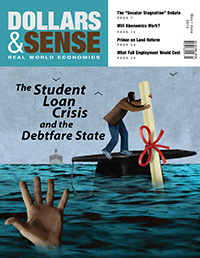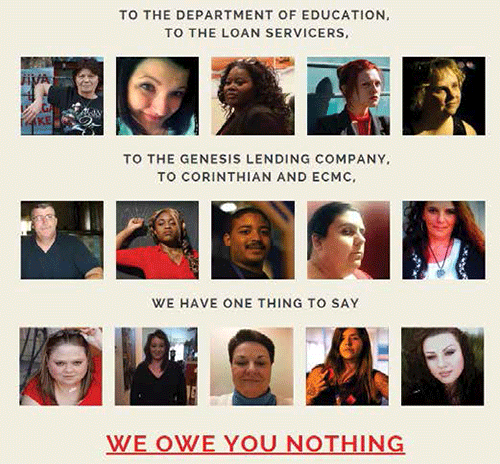Fighting Climate Change in Portlandia
Not only is failure not an option, those fighting to avert cataclysmic climate change have achieved important successes worthy of celebrating.
Gabby had worked in call centers for years, and was tired of it. She had always wanted to work in the medical field. Gabby (not her real name) is a working adult, not a teen or even in her twenties. She isn't trying to become a doctor. She just wants a working-class job in which she can make a decent living and feel fulfilled. In 2012, she finally took the leap toward a career change. She decided to enroll in the Everest Institute, a branch of Corinthian Colleges, Inc. (CCI), to get the certification she needed.

Gabby graduated at the top of her class, with a 3.9 grade point average, and was selected to be an "ambassador" for the institution. She was accepted for an unpaid externship program in a medical office. One year later, Gabby holds a temp position in the medical field, but she makes less money than she did at the call center, has no health insurance, and now has upwards of $20,000 in student-loan debt. Meanwhile, the school she attended was forced to shut down due to accusations of fraud and misrepresentation. She is still expected to pay the full debt she incurred for her year at Everest.
In a world that puts increasing value on higher education, some are profiting from people who, like Gabby, look to education as a step up to better working-class jobs. But some former students are fighting back. The "Corinthian 15" were 15 former students at CCI institutions who united, in February 2015, in a debt strike--refusing to pay back loans they took out to attend an institution that failed them. The debt-striking alumni met with Department of Education (DoE) officials in March 2015 to express their outrage about being targeted and exploited for profits, and to ask for help. As the Huffington Post put it, "The Education Department's answer ... Keep on waiting."

Since the Corinthian 15's founding, it has grown to over 100 former- student debt strikers, and has changed its name to the Corinthian 100. Clearly, this number has the potential to grow larger, and the larger it gets the more pressure it can put on the powers that be to cancel these debts.
CCI was founded in 1995 by five executives at National Education Centers, Inc. (NECI), a for-profit company in the vocational-education industry. If you have not heard of Corinthian, you may have heard of the company by its school names, like Everest, WyoTech, and Heald. CCI made in excess of $1 billion in annual revenue via for-profit colleges.
The accusations of fraud and misrepresentation at CCI go back years. Back in 2004, alumni filed legal claims against the company for misrepresentation of the ability to transfer credits. In 2005, four students filed suit claiming that they were not properly trained to pass national accredited exams. In 2008, alumni filed lawsuits claiming that they were presented misleading statistics about graduates' employment success. Their feelings of being targeted and used were essentially verified during a later investigation.
In internal company documents obtained by the Department of Justice, CCI described its target demographic as "'Isolated, 'impatient,' individuals with 'low self-esteem,' who have 'few people in their lives who care about them' and who are 'stuck' and 'unable to see and plan well for future.'"
In 2014, the DoE began an investigation of CCI. By that July, it forced the company to shut down twelve schools and sell 85 others. The Consumer Financial Protection Board (CFPB)--after a ten-month investigation--filed a lawsuit over CCI's loan program and debt-collection practices. When the DoE leveled a $30-million fine against CCI in April 2015--having found widespread "misrepresentation of job placement rates to current and prospective students"--the company shut down its remaining 28 campuses. Still, former students are left owing thousands of dollars, not only to private educational lenders, but also to the DoE in the form of federal student loan debt.
The Corinthian 100 are now demanding that the DoE cancel the federal student debt they owe for attending CCI. The idea of debt forgiveness makes sense: Students bore both explicit costs (tuition and fees, interest on their educational debt, etc.) and many implicit costs (such as time they could have been at work or in other educational programs) as a result of CCI's abuses. However, despite the fact that CCI has been investigated, fined, and effectively shut down by the Department of Education, the DoE is still expecting students to repay. It is hard to figure out which is more shameful: The company that markets career development via for-profit colleges, preying on low-income people who are just trying to solidify their place in the working class? Or the Department of Education, which knows what CCI has done, and is still charging the former students for the crime to which they are victims?
In general, the conditions for cancellation of student debt are highly restrictive. For example, one program requires former students to pay 15% of their disposable incomes towards past educational loans. Then, after 25 years, a student can apply for cancellation of the remaining balance. The National Consumer Law Center (NCLC), however, suggests that the DoE has the authority to cancel the illegitimate Corinthian-related debt with no strings attached. "Under the Higher Education Act," says NCLC attorney Robyn Smith, "the Department of Education has clear statutory authority to grant automatic debt cancellations to Corinthian student loan borrowers." Of course, this doesn't mean that debt cancellation will be easy for former Corinthian students to win.
Yet, thanks to the Corinthian 15, turned Corinthian 100, and perhaps thousands more from Corinthian and elsewhere, it will not be easy-going for the parties profiting from this misfortune either. That's the unexpected twist in the plan of preying on "easy" targets. The targets are now on the move.